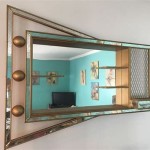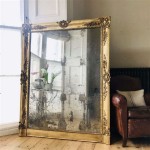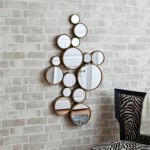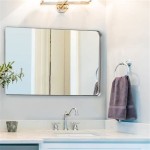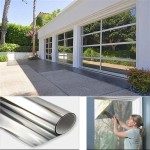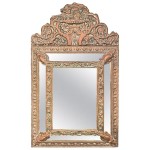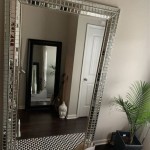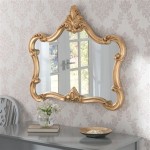Adding a Wood Frame to Your Bathroom Mirror: A Step-by-Step Guide
A bathroom mirror is an essential element, not only for its practical functionality but also for its role in enhancing the visual appeal of the space. Adding a wood frame to your bathroom mirror can instantly elevate its aesthetic, transforming it from a plain fixture into a statement piece. This guide provides a comprehensive step-by-step process for adding a wood frame to your bathroom mirror, empowering you to embark on this DIY project.
Step 1: Preparation and Supplies
Before embarking on the framing project, gather all necessary materials and tools. This will streamline the process and ensure a smooth workflow. Here's a list of essentials:
- **Mirror:** The centerpiece of the project, choose a mirror that complements the bathroom's style and size.
- **Wood:** Select wood that suits your bathroom's aesthetic and complements the existing decor. Common options include oak, walnut, pine, or mahogany. Consider the wood's natural grain and color tone.
- **Miter Saw:** A precision tool for creating clean, angled cuts for the frame's corners.
- **Wood Glue:** A strong adhesive for securely joining the frame pieces.
- **Wood Stain or Paint:** Choose a finish that enhances the wood's natural beauty or introduces a desired color to match the bathroom's design scheme.
- **Measuring Tape:** Accurately measure the mirror to ensure the frame fits perfectly.
- **Pencil:** Mark the wood for precise cuts.
- **Clamps:** Securely hold the frame pieces while the glue dries.
- **Sandpaper:** Smooth any rough edges after cutting and sanding the wood before applying the finish.
- **Safety Glasses and Gloves:** Protect your eyes and hands during the project.
Step 2: Cutting and Assembling the Frame
With the tools and materials ready, the next step is to cut and assemble the frame. Begin by measuring the mirror's dimensions and carefully transfer these measurements to the wood. Remember to account for the frame's thickness when calculating these measurements. Using the miter saw, carefully cut the wood to the desired lengths, ensuring clean, accurate cuts.
Once all frame pieces are cut, use wood glue to join them together. Apply a generous bead of glue along the edges of each piece and press them together firmly. Secure the joints using clamps to ensure a strong bond. Allow the glue to dry completely before proceeding to the next step.
Step 3: Finishing the Frame
After the glue has dried, it's time to finish the frame to achieve the desired look. This step involves sanding, staining or painting, and applying a protective sealant. Begin by sanding the frame to create a smooth surface. Use progressively finer grit sandpaper to remove any rough edges or imperfections.
Next, apply the desired stain or paint. If using stain, follow the manufacturer's instructions for application. Apply multiple thin coats, allowing each coat to dry completely before applying the next. If using paint, ensure smooth, even coverage. Remember to protect the mirror surface during this step by covering it with a drop cloth or masking tape. Once the stain or paint has dried, apply a protective sealant to protect the finish from moisture and everyday wear.
Step 4: Attaching the Frame to the Mirror
With the frame finished, it's time to attach it to the mirror. You can choose from several methods for attaching the frame, each offering its advantages and disadvantages. Some common methods include:
- **Mirror Clips:** These clips are designed to hold the frame securely against the mirror while allowing for easy installation and removal. They are typically used for smaller to medium-sized mirrors.
- **Adhesive:** Apply a strong adhesive, like construction adhesive, to the back of the frame. Position the frame carefully on the mirror and press firmly. Allow the adhesive to cure fully before handling the mirror.
- **Screws:** If the mirror has a backing that can support screws, you can attach the frame using screws. Drill pilot holes to prevent the wood from splitting during screw insertion. Secure the screws firmly to ensure a secure bond.
When selecting an attachment method, consider the mirror's size, weight, and the type of backing it has. Consult with a hardware professional for recommendations based on your specific needs.
Step 5: Final Touches
After the frame is securely attached to the mirror, it's time to address any final touches. This might include cleaning the mirror, removing any excess glue, or adding a finishing touch, like a decorative element or a hanger for easy mounting. Inspect the entire project for any blemishes or imperfections and address them before finalizing the installation. Once satisfied with the final result, carefully mount the framed mirror in its designated location in the bathroom.
Adding a wood frame to your bathroom mirror is a cost-effective way to enhance the space's aesthetics. With a little time, effort, and the right materials, you can elevate the look of your bathroom and create a truly personalized sanctuary.

Mirror Frame Diy How To Update A Basic Bathroom Our Faux Farmhouse

Mirror Frame Diy How To Update A Basic Bathroom Our Faux Farmhouse

How To Frame A Mirror

Mirror Frame Diy How To Update A Basic Bathroom Our Faux Farmhouse

How To Build A Wood Frame Around Bathroom Mirror Young House Love

Diy Wood Mirror Frame For Bathroom Vanity Tidbits
Diy Wood Frame Mirror Farmhouse Industrial Bathroom Joyfully Treasured

Diy Bathroom Mirror Frame Without Removing Clips Her Happy Home

How To Diy Upgrade Your Bathroom Mirror With A Stained Wood Frame Building Our Rez Mirrors Framed

Diy Framed Bathroom Mirrors Living With Lady

